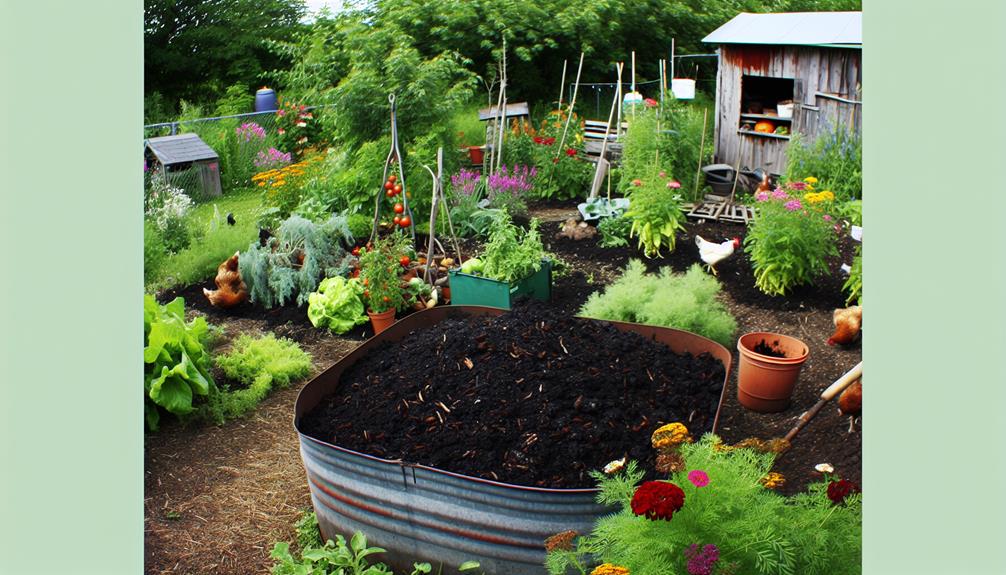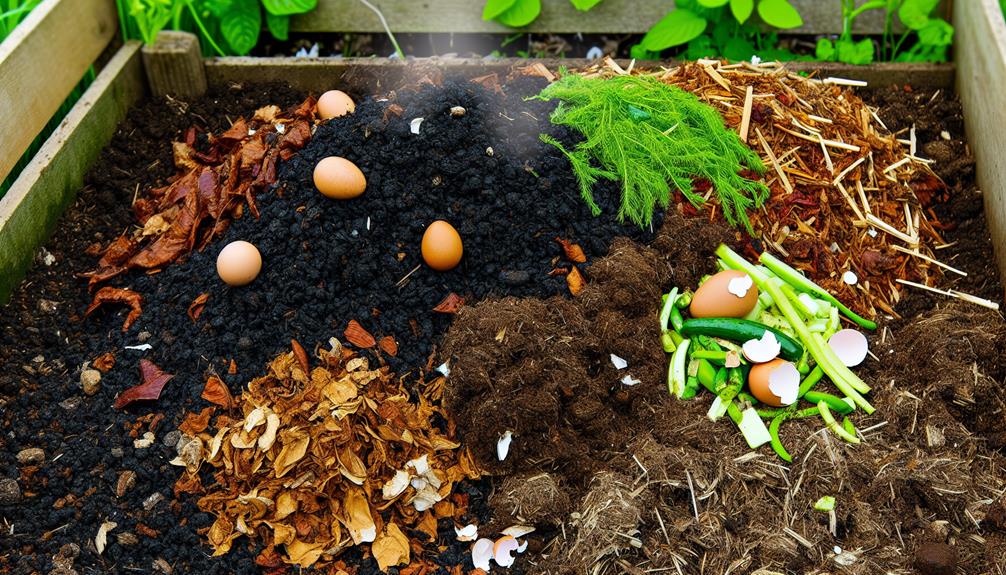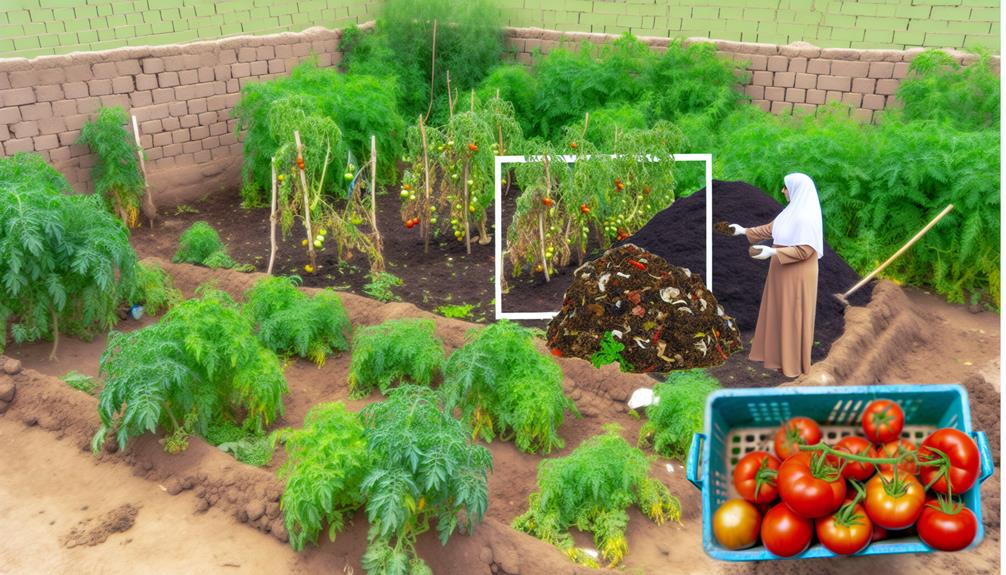

Yes, you can compost chicken manure, making it an excellent addition to your garden. Chicken manure is rich in nitrogen, phosphorus, and potassium, which greatly improve soil fertility and plant growth. To compost effectively, balance the high nitrogen content with carbon-rich materials like straw or leaves, aiming for a carbon-to-nitrogen ratio of 25-30:1.
Regularly turn the pile to maintain airflow and microbial activity. Wear gloves and masks when handling manure to avoid contamination. Properly composted chicken manure enhances soil structure and moisture retention. For more detailed steps on composting chicken manure, including troubleshooting tips, just continue onward.
One major benefit of chicken manure is its high nutrient content, which can greatly enrich your compost. By adding chicken manure to your compost pile, you’re introducing a rich source of nitrogen, phosphorus, and potassium—essential nutrients that boost soil fertility. This nutrient-rich compost can greatly improve the growth of your plants by providing them with the essential elements they need to thrive.
When you incorporate chicken manure into your compost, you’re creating a balanced, nutrient-dense mixture. The high nitrogen content in the manure accelerates the composting process, helping organic materials break down more quickly. This results in a finished compost that’s ready to nourish your garden soil sooner than you might expect.
Moreover, chicken manure also contains other beneficial micronutrients and organic matter that enhance soil structure and increase its moisture-holding capacity. This means your plants will have better access to water and nutrients, which promotes stronger root development and healthier growth.
To maximize the benefits of chicken manure, make sure it’s thoroughly mixed with other compost materials. By doing so, you’ll create a well-balanced compost that enriches your soil, boosts fertility, and supports a thriving garden community.
To prepare chicken manure for composting, start by collecting it with minimal bedding material to guarantee purity.
Balance the carbon ratio by mixing in carbon-rich materials like straw or leaves.
Maintain adequate moisture by checking that the mixture feels like a damp sponge.
Start by gathering fresh chicken manure daily to prevent odor buildup and make sure it’s free from contaminants. Establishing a consistent collection frequency is crucial. Using sturdy manure bins will help you manage the waste effectively. Place the bins close to your chicken coop for convenience, and make certain they’re covered to keep rain out and odors in.
When collecting manure, wear gloves to maintain hygiene. Scoop the manure directly into the bins, avoiding any bedding materials or foreign objects. Bedding can be composted separately but might affect the balance of your compost if mixed with manure. Once the bins are full, transport them to your composting site.
To keep the process smooth, designate specific times each day for collection. This routine not only helps in managing the workload but also keeps your chicken coop clean and your composting process efficient.
Keeping the bins clean is also important. Rinse them regularly to prevent any buildup of harmful bacteria.
After collecting the manure, you need to balance its carbon ratio to create ideal compost. Chicken manure is rich in nitrogen, which is great for composting, but it needs to be balanced with carbon-rich materials. This balance is vital for the composting process to work effectively.
You’ll want to add carbon input from sources like straw, dried leaves, or wood shavings. These materials help offset the high nitrogen output from the chicken manure. Aim for a carbon-to-nitrogen ratio of about 30:1. If you add too much nitrogen, the compost can become too hot and produce an unpleasant odor. Conversely, too much carbon can slow down the decomposition process.
To get started, mix one part chicken manure with two to three parts carbon-rich material. This mixture ensures that the bacteria in your compost pile have enough energy to break down the materials efficiently.
Turn the pile regularly to aerate it and help maintain the balance between carbon input and nitrogen output. By doing so, you’ll foster a healthy composting environment, promoting faster decomposition and creating nutrient-rich compost for your garden.
Maintaining the right moisture level in your compost pile is crucial for the breakdown of chicken manure and other organic materials. You want your compost to be as moist as a wrung-out sponge, which guarantees efficient microbial activity.
To achieve this, regularly check the moisture retention of your pile. If it’s too dry, the composting process slows down, and if it’s too wet, it can become anaerobic and smelly.
To manage your pile’s water requirements, add water gradually. Use a garden hose or a watering can to evenly distribute it. Mix the pile thoroughly to ensure that all materials are moist but not soggy. You’ll find it helpful to turn your pile regularly, which also helps with aeration and prevents excessive moisture buildup.
Consider layering dry materials like straw or dry leaves with your chicken manure. These materials help with both moisture retention and aeration. If you’re in a particularly dry climate, covering your compost pile with a tarp can help maintain moisture in.
Also Read: Can You Compost Bread?
Achieving the right balance of carbon and nitrogen is essential for effective composting of chicken manure. Chicken manure is rich in nitrogen, making it a superb nitrogen source. However, to prevent a smelly, slow-decomposing pile, you need to mix it with carbon materials. Think of carbon as the ‘brown’ elements—straw, leaves, or shredded paper.

Start by gathering your chicken manure and mixing it with these carbon materials. Aim for a carbon-to-nitrogen (C:N) ratio of about 25-30:1. This ratio guarantees that your compost pile heats up properly, breaking down the materials efficiently. Too much nitrogen, and the pile becomes slimy and smelly. Too much carbon, and it decomposes too slowly.
For a practical approach, layer your compost with approximately three parts carbon materials to one part chicken manure. You could use a pitchfork to mix the materials thoroughly, ensuring even distribution. This not only balances the elements but also introduces crucial oxygen, aiding the decomposition process.
There are several effective methods for composting chicken manure, each with its own set of benefits and considerations. You can choose from traditional pile composting, windrow composting, or even using a compost tumbler. Each method requires a specific composting temperature and careful management of microbial activity to ensure success.
In traditional pile composting, you build a stationary pile of chicken manure mixed with carbon-rich materials like straw or leaves. Turn the pile regularly to maintain airflow and promote microbial activity. Aim for a composting temperature between 130°F and 150°F to eliminate pathogens and weed seeds.
Windrow composting involves creating long rows of compost material. This method is great if you have a larger volume of chicken manure. Like pile composting, turning the windrows ensures even decomposition and maintains the right composting temperature.
Using a compost tumbler can be more convenient for small-scale composting. The enclosed environment helps maintain consistent composting temperature and moisture levels. Simply rotate the tumbler to aerate the compost and boost microbial activity.
Regardless of the method you choose, regularly monitor temperature and moisture levels. These factors are essential for fostering the right microbial environment and achieving efficient composting.
When composting chicken manure, you need to prioritize safety by using the right protective gear, like gloves and masks, to avoid direct contact and inhalation of harmful particles.
Handle the manure properly by washing your hands thoroughly and using dedicated tools.
In addition, make sure you store and treat the manure correctly to prevent contamination and promote effective composting.
Wearing proper protective gear, such as gloves, masks, and boots, is essential to guarantee your safety while handling chicken manure for composting.
First, let’s talk about gloves selection. Opt for durable, waterproof gloves that provide a snug fit, ensuring they protect your hands from harmful bacteria and harsh chemicals. Latex or nitrile gloves are excellent choices, as they offer flexibility and resistance to punctures.
When it comes to mask types, you’ll want to choose one that effectively filters out fine particles and unpleasant odors. A disposable N95 mask or a reusable respirator with replaceable filters can protect your respiratory system from inhaling harmful pathogens and dust. These masks are designed to fit securely over your nose and mouth, providing a barrier against airborne contaminants.
Don’t forget about wearing sturdy, waterproof boots to protect your feet. They should be easy to clean and provide good traction to prevent slips and falls. Additionally, consider wearing long sleeves and pants to further shield your skin from direct contact with the manure.
To guarantee safe composting practices, always handle chicken manure with care to prevent contamination and health risks. Start by wearing protective gear, like gloves and masks, to avoid direct contact with the manure. Make sure you wash your hands thoroughly after handling it.
When mixing chicken manure into your compost pile, use a pitchfork or shovel. This helps maintain a safe distance while incorporating the manure evenly. It’s also important to add manure additives to balance the nitrogen content and reduce odors. These additives, such as straw or sawdust, will help create a more effective compost mix.
Using compost accelerators can speed up the decomposition process. These products contain beneficial bacteria and enzymes that break down organic material more quickly, allowing you to achieve usable compost faster. However, remember to follow the instructions on the compost accelerator packaging to avoid overuse, which could disrupt the composting process.
Always compost chicken manure in a designated area to prevent cross-contamination. Keep pets and children away from the compost pile to minimize health risks. By following these handling techniques, you’ll ensure a safe and efficient composting process, fostering a healthier garden and community.
Guarantee proper storage and treatment of chicken manure to maintain safety and maximize composting efficiency. By following these steps, you’ll ensure that your composting process is both effective and safe for everyone involved.
One common mistake when composting chicken manure is adding too much at once, which can overwhelm the compost pile. When you add excessive amounts, it can create an imbalance, leading to unpleasant odors and a slower decomposition process. Instead, mix chicken manure with a balanced ratio of green and brown materials to maintain proper aeration and moisture levels.
Choosing an improper location for your compost pile is another frequent error. Avoid placing your pile in low-lying areas where water can accumulate, as this can turn your compost anaerobic and smelly. A well-drained, partially shaded spot is ideal. This guarantees that your compost gets enough airflow and doesn’t get too wet or too dry.
Using incorrect materials is also a pitfall to watch out for. Composting chicken manure requires a careful mix of high-nitrogen materials (like the manure itself) and high-carbon materials (such as straw, leaves, or wood chips). Avoid adding materials like meat, dairy, or treated wood, which can introduce pathogens or chemicals to your compost.
Also Read: Can You Compost Branches?
Once you’ve successfully composted your chicken manure, it’s time to enrich your garden soil with this nutrient-rich amendment. Using compost effectively can transform your garden design and improve soil structure, making your plants healthier and more productive.

Here’s how to incorporate it into your garden:
Also Read: Can You Compost Bag?
When composting chicken manure, you might encounter some common issues that can be easily resolved with a few adjustments. One of the most frequent problems is bad odors. If your compost pile smells foul, it usually means there’s an imbalance between green and brown materials. Make sure you’re adding enough carbon-rich materials like straw or leaves to balance the nitrogen in the manure. Turn the pile regularly to guarantee proper aeration, which helps reduce odors.
Another issue is pests infestation. Mice, rats, and insects can be drawn to your compost pile if it contains food scraps or if it’s too wet. To prevent this, avoid adding meat, dairy, or oily foods to the compost. Keep the pile covered with a tarp or a compost bin to limit access. Regularly check the moisture level; it should be as damp as a wrung-out sponge.
Additionally, you might face slow decomposition. This usually happens if the pile is too dry, too wet, or lacks adequate turning. Adjust the moisture level and regularly aerate the pile to expedite the process.
With these tips, you can effectively manage your chicken manure compost.
It typically takes six to nine months for chicken manure to compost fully. By carefully managing temperature and controlling moisture, you’ll guarantee it breaks down efficiently, creating nutrient-rich compost that’s perfect for your garden community.
Yes, chicken manure can attract pests during composting. To guarantee pest prevention and effective odor management, turn the compost regularly and cover it with carbon-rich materials. This helps maintain community harmony and a healthy composting environment.
Yes, it’s necessary to age chicken manure before adding it to compost. Aging benefits include increased nutrient content and reduced risk of burning plants. Your garden will thrive, and you’ll feel like a composting pro!
You can store chicken manure in sealed storage containers to manage odor control and prevent pests. Joining a community garden group can also provide tips and support for effective manure storage before composting.
Yes, you can compost chicken manure with other types of animal manure. Just make sure to maintain proper mixing ratios to uphold a good nutrient balance. This way, you’ll create a rich, balanced compost that benefits your entire garden community.
To successfully compost chicken manure, remember to balance carbon and nitrogen, use appropriate composting methods, and follow safety precautions.
Avoid common mistakes like adding too much manure at once or not monitoring moisture levels.
Once your compost is ready, it will enrich your garden soil with valuable nutrients.
Keep an eye out for troubleshooting issues and address them promptly.
With these steps, you’ll turn chicken manure into a beneficial garden resource efficiently and safely.
